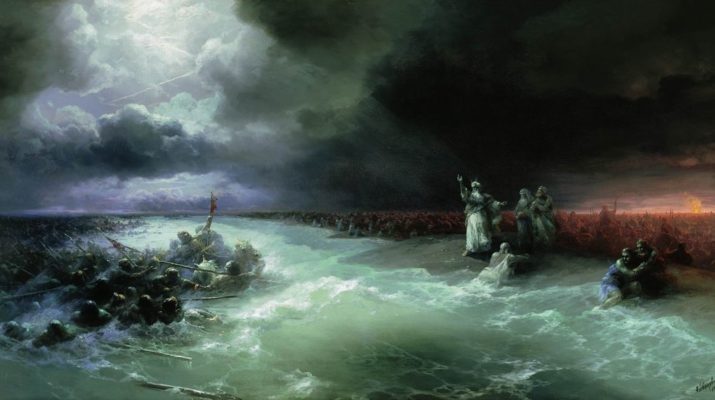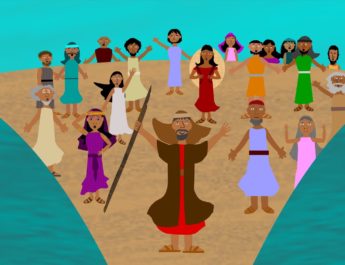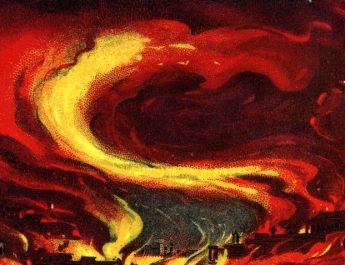Exodus 14:19-31
Ordinary A42
BibleHub
19 The angelA of GodB who was going beforeC the IsraeliteD armyE movedF and went behind them;
Notes on verse 19a
A “angel” = malak. This is a messenger, an angel, or a deputy of some kind. Can be used for human messengers literally or for prophets, priests, or teachers as messengers of God. Also used for supernatural messengers i.e. angels.
B “God” = Elohim.
C “before” = paneh. From panah (to turn, face, appear). This is face in a literal or figurative sense. It could be face, presence, anger, respect. It can also be used of God to indicate divine favor or presence.
D “Israelite” = yisrael. From sarah (to persist, exert oneself, contend, persevere, wrestle, prevail) + el (God or god). This is God strives or one who strives with God; new name for Jacob and for his offspring. This refers to the people and to the land.
E “army” = machaneh. From chanah (to decline, bending down, or living in tents; can be camping to create a home or camping as a part of battle). This is an encampment, whether of people traveling together or soldiers. So, it can be a camp band, or company as well as an army of soldiers. Also can be used of other groups like animals, angels or stars.
F “moved” = nasa. This is properly pulling up as when one pulls up tent pegs or stakes. This would imply striking tents in order to start a journey. So this could be bring, pullout, set out, journey, or cause to go away.
and the pillarG of cloudH moved from in front ofI them and took its placeJ behind them.
Notes on verse 19b
G “pillar” = ammud. From amad (to stand up in a literal or figurative sense; to establish, continue, endure, take a stand, act, be a servant, stand still, remain, stand against an enemy). This is a pillar, stand, or platform.
H “cloud” = anan. Perhaps from anan (cover, cloud over; figuratively, acting in a secret way, practicing magic or soothsaying). This is a cloud as something that covers the sky.
I “in front of” = paneh. Same as “before” in v19. See note C above.
J “took its place” = amad. Related to “pillar” in v19. See note G above.
20 It came between the army of EgyptK and the army of Israel. And so the cloud was there with the darkness,L and it lit upM the night;N one did not come near the other all night.
Notes on verse 20
K “Egypt” = mitsrayim. Perhaps from matsor (besieged or fortified place, bulwark, entrenchment; something hemmed in; a siege or distress or fastness); from tsur (to confine, besiege, to cramp). This is Egypt.
L “darkness” = choshek. From chashak (to be or become dark). This is literal darkness is contrast to light. Figuratively, it can be obscurity, sorrow, misery, blindness, wickedness, destruction, death. It can also be hiding places. Additionally, it can mean judgment, mourning, ignorance, evil, or sin.
M “lit up” = or. This is to light, shine, set on fire – to be luminous in a literal or figurative sense.
N “night” = layil. Properly, this refers to light twisting away. It is used for night or midnight. Figuratively, this can mean adversity.
21 Then MosesO stretched outP his handQ over the sea.R
Notes on verse 21a
O “Moses” = mosheh. From mashah (to pull out in a literal or figurative sense, to draw out) OR from Egyptian mes or mesu (child, son i.e. child of…). This is Moses – the one drawn out from the water, which is to say, rescued. If derived from the Egyptian, his name would share a root with Rameses and Thutmose.
P “stretched out” = natah. This is to stretch or spread out, to extend, or bend. In can also imply moral deflection.
Q “hand” = yad. This is hand, ability, power. Hand in a literal sense, but also what one can do or the means by which one does it.
R “sea” = yam. Root may mean to roar. This is the sea, often referring to the Mediterranean. It comes from the root in the sense of the roar of crashing surf. This word is sometimes used for rivers or other sources of water. It can mean to the west or to the south.
The LordS drove the sea backT by a strongU eastV windW all night, and turned the sea into dry land;X and the waters were divided.Y
Notes on verse 21b
S “Lord” = YHVH. From havah (to be, become) or hayah (to come to pass, become, be). This is the name of the God of Israel, the self-existent and eternal one, the tetragrammaton. This pronunciation has been lost to time so “Lord” is generally used in its place.
T “drove…back” = halak. This is go, come, walk. It is walk literally and figuratively and includes people and animals. It can be used figuratively for one’s moral life – how we walk according to God’s way or against it. It can also refer to the walk of life as in the course one’s life takes, the choices we make, etc.
U “strong” = az. From azaz (to be strong, become fixed, be bold, prevail, be impudent; it means to be stout literally or figuratively; a Late Hebrew word). This is strong or mighty. It can also refer to power or vehemence or mean greedy.
V “east” = qadim. From the same as qedem (front, formerly, before, east, eternal, everlasting, antiquity). This is the front part and so eastward. Sometimes used as a shorthand for the east wind.
W “wind” = ruach. This is breath, wind, air, cool, spirit. This is wind, which resembles the breath and so this can be used figuratively for life itself or being frail/mortal/impermanent. It can refer to the air of the sky or the spirit.
X “dry land” = charabah. 8x in OT. From chareb (to be waste or desolate, destroyer). This is dry ground, dry, or desert.
Y “divided” = baqa. This is to break open, breach, divide, rip, shake, tear. It can also mean dash into pieces or being ready to burst.
22 The IsraelitesZ went intoAA the sea on dry ground,BB the waters forming a wallCC for them on their rightDD and on their left.EE
Notes on verse 22
Z “Israelites” = ben + yisrael. Literally “children of Israel.” Same as “Israelite” in v19. See note D above.
AA “into” = tavek. This is among, middle, in the midst, the center. Perhaps, properly, to sever.
BB “dry ground” = yabbashah. 14x in OT – word used for dry land in Genesis 1:9-10. From yabesh (to dry up, be withered, be dry; to be ashamed, confused, or disappointed). This is dry land or dry ground.
CC “wall” = chomah. From the same as cham (father-in-law – one’s husband’s father; perhaps from a root meaning to join). This is a wall – a wall as used for protection.
DD “right” = yamin. May be from yamam (to go or choose the right, use the right hand; to be physically fit or firm). This can mean right hand, right side, or south. Since most people are right-handed, the metaphorical usage of this word presumes that the right hand is stronger and more agile. Thus, it is the instrument of power and action.
EE “left” = semol. Perhaps from the same as simlah (mantle, clothes, wrapper); perhaps from semel (image, figure, likeness). This is left, left side, or north as the part that is dark.
23 The EgyptiansFF pursued,GG and went intoHH the sea after them, all of Pharaoh’sII horses,JJ chariots,KK and chariot drivers.LL
Notes on verse 23
FF “Egyptians” = mitsri. Related to “Egypt” in v20. From the same as mitsrayim (see note K above). This is Egyptian.
GG “pursued” = radaph. This is to chase after, pursue, hunt, or persecute. It is running after someone or something, generally with hostile motives.
HH “into” = el + tavek. Same as “into” in v22. See note AA above.
II “Pharaoh’s” = paroh. From Egyptian pr (palace, pharaoh; literally house + great). This is Pharaoh, a title for Egyptian kings. See https://en.wiktionary.org/wiki/pharaoh
JJ “horses” = sus. Root may mean to skip as in jump for joy. This is a crane or a swift bird. It is also a horse as leaping.
KK “chariots” = rekeb. From rakab (to ride an animal or in some vehicle; also, bringing on a horse). This is a vehicle, wagon, or chariot. It can be cavalry or an individual rider.
LL “chariot drivers” = parash. From parash (to make distinct, separate, scatter; can also imply to wound). This is a horse or a person who rides a horse. A chariot driver or cavalry as a collective.
24 At the morningMM watchNN the Lord in the pillar of fire and cloud looked downOO upon the Egyptian army, and threw the Egyptian army into panic.PP
Notes on verse 24
MM “morning” = boqer. From baqar (to seek, plow, break forth, admire, care for). This refers to the break of day. So it is dawn, early, morning, or morrow.
NN “watch” = ashmoreth. 7x in OT. From shamar (to keep, watch, or preserve; to guard something or to protect it as a thorny hedge protects something). This is a watch.
OO “looked down” = shaqaph. This is to look down or look out. Properly, it is looking by leaning out a window. It can be peeping or gazing.
PP “threw…into panic” = hamam. 14x in OT. This is being noisy, confused, thrown into confusion, trouble, cause a commotion, disturb, rout, damage, destroy.
25 He cloggedQQ their chariotRR wheels so that they turnedSS with difficulty.TT
Notes on verse 25a
QQ “clogged” = sur. This is to turn aside in a literal or figurative sense – to depart, decline, rebel, remove, or withdraw.
RR “chariot” = merkabah. Related to “chariots” in v23. From merkab (chariot, saddle, covering; any seat in a vehicle); from rakab (see note KK above). This is a chariot.
SS “turned” = nahag. This is to drive as in driving flocks, but also driving in animal or vehicle like a chariot. It can mean to carry away, lead, drive away, proceed, or guide. It can also relate to behavior and what one is accustomed to.
TT “difficulty” = kebeduth. From kabad (to be heavy, weighty, burdensome). This is heaviness or difficulty.
The Egyptians said, “Let us fleeUU fromVV the Israelites, for the Lord is fightingWW for them against Egypt.”
Notes on verse 25b
UU “flee” = nus. This is to flee, flit, escape, hide, vanish.
VV {untranslated} = paneh. Same as “before” in v19. See note C above.
WW “fighting” = lacham. This is to eat or feed on. Figuratively, it is to battle as a kind of consumption/destruction.
26 Then the Lord said to Moses, “Stretch out your hand over the sea, so that the water may come backXX upon the Egyptians, upon their chariots and chariot drivers.” 27 So Moses stretched out his hand over the sea, and at dawn the sea returnedYY to its normal depth.ZZ As the Egyptians fled beforeAAA it, the Lord tossedBBB the Egyptians into the sea.
Notes on verses 26-27
XX “come back” = shub. To turn back, return, turn away – literally or figuratively. Doesn’t necessarily imply going back to where you started from. This is also the root verb for the Hebrew word for repentance “teshubah.”
YY {untranslated} = panah. Related to “before” in v19. See note C above.
ZZ “normal depth” = ethan. 13x in OT. Root might mean to continue. This is mighty, strong, ever-flowing, enduring, or permanence.
AAA “before” = qirah. From the same as qara (to happen, meet, bring about). This is any kind of encounter, whether peaceful, hostile, or incidental. It can also mean help or seek.
BBB “tossed” = naar. 11x in OT. This is to shake, toss up and down, tumble around, overthrow, shake off.
28 The waters returned and coveredCCC the chariots and the chariot drivers, the entire armyDDD of Pharaoh that had followed them into the sea; not one of them remained.EEE 29 But the Israelites walked on dry ground through the sea, the waters forming a wall for them on their right and on their left.
Notes on verses 28-29
CCC “covered” = kasah. This is to cover, conceal, overwhelm. It is to cover as clothes do or to hide a secret.
DDD “army” = chel. From chul (whirling around so dancing as in a circle or writhing in pain; used particularly for the pain of childbirth or from writhing due to fear; can also be falling in pain or waiting) OR from chayil (strength, wealth, ability, activity; a soldier or a company of soldiers; goods; a force of people, means, or goods; valor, virtue, or strength); from chul (to be firm, strong, prosperous; to endure). This is an army, entrenchment, fortress, wall, or host.
EEE “remained” = shaar. Properly, this is swelling up i.e. being left over, a remnant, remaining, being redundant.
30 Thus the Lord savedFFF Israel that day fromGGG the Egyptians; and Israel saw the Egyptians dead on the seashore. 31 Israel saw the greatHHH workIII that the Lord did against the Egyptians.
Notes on verses 30-31a
FFF “saved” = yasha. To deliver, defend, help, preserve, rescue, be safe. Properly, to be open, wide or free, which implies being safe. Used causatively, it means to free.
GGG “from” = yad. Literally “from the hand of.” Same as “hand” in v21. See note Q above.
HHH “great” = gadol. From gadal (to grow up, become great, become wealthy – to advance. The root meaning may be to twist in the sense of the process of growing). This is great, high, bigger, noble, old, marvelous. It can also refer to someone who is powerful or distinguished.
III “work” = yad. Same as “hand” in v21. See note Q above.
So the peopleJJJ fearedKKK the Lord and believedLLL in the Lord and in his servantMMM Moses.
Notes on verse 31b
JJJ “people” = am. From amam (to darken, hide, associate; creating shadows by huddling together). This is people or nation. It can be used specifically for a tribe, collectively of troops or armies, or figuratively to refer to a flock of animals.
KKK “feared” = yare. This is to fear, be afraid, dreadful. It can also refer to fearful reverence – to fear in a moral sense is to say to revere, respect.
LLL “believed” = aman. This is to believe, endure, fulfill, confirm, support, be faithful. It is to put one’s trust in, be steadfast. Figuratively, this is to be firm, steadfast, or faithful, trusting, believing, being permanent, morally solid. This is where the word “amen” comes from.
MMM “servant” = ebed. From abad (to work, serve, compel; any kind of work; used causatively, can mean to enslave or keep in bondage). This is a servant, slave, or bondservant.
Image credit: “Passage of the Jews through the Red Sea” by Ivan Aivazovsky, 1891.




